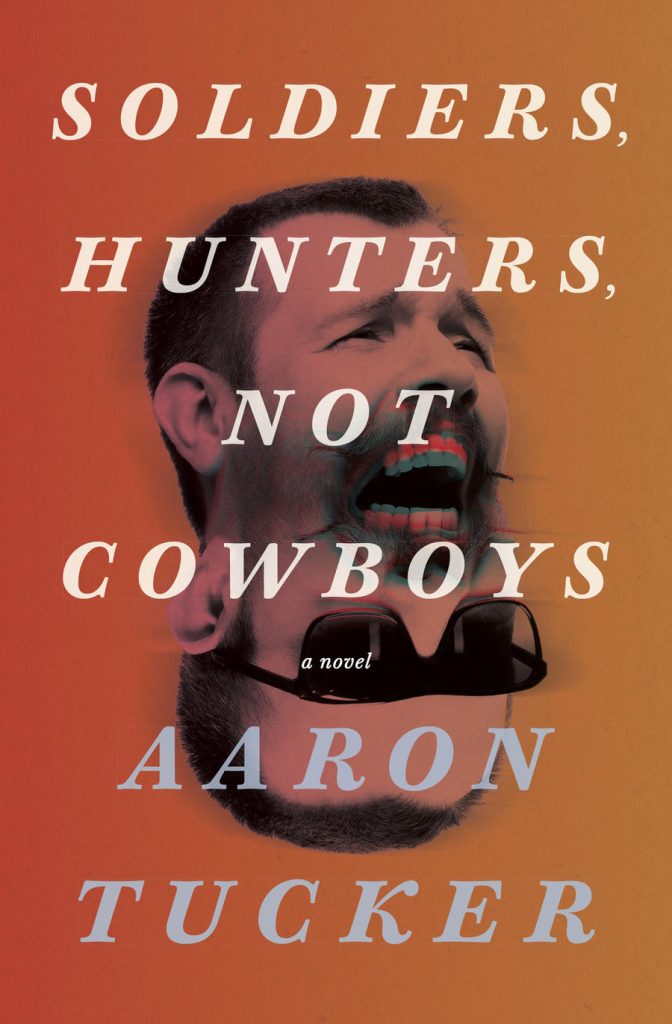Soldiers, Hunters, Not Cowboys was published by Coach House Books on June 6th, 2023.
‘Tucker is well on his way to stealing the weird fiction mantle away from Don DeLillo.’ – Emily Schultz
Two days before a mysterious catastrophe befalls Toronto, before a man decides he must trek throughh violence and bloodshed to save his ex-girlfriend, the two of them are having a conversation about John Wayne. She’s telling him about The Searchers as a way to talk about their histories, their families, maybe even their relationship. But as he drinks more and more, the evening takes a difficult turn. Soon after, he wakes up to disaster and decides to be a hero.
Adam Nayman, writing for The Toronto Star, calls the novel “a complex meditation on how its story plays in different ways to different viewers — the mix of obsession, devotion and ambivalence that goes into understanding a problematic masterpiece.” Jean Marc Ah-Sen in Quill and Quire writes “Tucker writes about the power of film to creep into our collective consciousness with expressive accuracy, and his apocalyptic vision of the last cowboy warns that as archetypes intersect with a toxic ideology, it can only lead to a cretinous kind of irrelevance.”
Using the tropes of both the Western and the disaster movie, Soldiers, Hunters, Not Cowboys looks at the violence of our contemporary masculinity and its deep roots in shaping our culture.
‘Ask the right questions and a conversation about the movies becomes a conversation about your life, family, past, and everything you value: Aaron Tucker’s novel, which starts chatty before turning deeply, unexpectedly inward, grasps the ceaseless, sometimes terrible relevance of violence and troubling art.’ – Naben Ruthnum, author of A Hero of Our Time
‘In Soldiers, Hunters, Not Cowboys, Aaron Tucker refuses the easy projections of masculinity from film history. Instead he gallops into the screen to sift out how drama collaborates with the bloodiest of truths.’ – Emily Schultz, author of The Blondes and Little Threats
‘Sad, smart, innocent, and wise. A relentless retelling of a movie and a life, full of hope, if there is any.’ – John Haskell, author of The Complete Ballet: A Fictional Essay in Five Acts
Description
The novel takes up the legacy of violent masculinity through the figure of John Wayne and his role as Ethan Edwards in the film The Searchers (Dir. John Ford, 1956). Ford’s film has been lauded by a generation of filmmakers, including Martin Scorsese and Steven Spielberg, and was listed as the number twelve American movie all time by the American Film Institute; Wayne’s acting within the film has likewise been praised as his best performance. Just as telling, the film was also named Brietbart’s number one movie of all time in 2015; that Breitbart, a notoriously far right-wing website, would name this film as the pinnacle of filmmaking illuminates its place within the consciousness of a “Make America Great Again” ethos. I wanted to revisit this text, including the original novel by Alan Le May (1954), in order to unpack its complicated legacy as it surfaces the overlaps between the genre of Western movies, John Wayne, settler colonialism, toxic masculinity and our current moment of aggrieved individualism and heightened nationalism.
The first section is set on a Saturday night and is entirely dialogue between a woman and man, both in their mid-30s, in her apartment in Toronto. Like Luis Molina in Puig’s book, the woman recounts, scene by scene, the events of “The Searchers” to the man, all the while trying to explain to him why she is so obsessed with the film. The first section then weaves together both of their personal histories and relationship with their families, in particular their fathers, alongside the events of the film; the film then opens up further conversations into contemporary fears around masculinity and the long and complicated shadow that a figure like John Wayne casts. The woman argues that the film is indicative of certain narratives of male identity that she finds related to events like the Toronto terrorist attacks of recent years that were carried out by young men. Her thinking and arguing is balanced by his resistance and his own childhood in a small town in British Columbia, and how he was raised in that conservative environment. The first section is framed around the film, and its climax is a near violent altercation between the man and woman, after which the man storms out.
The second section of the book takes place two days later after an unnamed catastrophic event has taken place in downtown Toronto; while the book never names the event, it appears eventually to be a terrorist attack on a series of downtown buildings. The man wakes up just after these events and goes out into his St. James Town neighbourhood: first he attempts to figure out what happened, and, second, he tries to “heroically” get across the city to the woman’s apartment. This second section is told via a stream of consciousness style in which the chaos and urgency of the mysterious events is the background for the increasing blurring between the man’s recounting of what he sees and hallucinations based in his own memories. In conversation with Don DeLillo’s “White Noise” (1985), there is a cloud that inches further north from downtown, and it’s unclear how that cloud is affecting him as his journey across Toronto descends further into darkness and violence. The second half echoes the plot of “The Searchers,” with the man casting himself as a pseudo-John Wayne type figure, who, in the end, is undone by his stereotypically masculine actions.
